An 11-year-old child with an abnormally large neck was diagnosed with thyroid disease, which could lead to slow growth and delayed puberty if not treated promptly.
An 11-year-old girl visited Medlatec General Hospital with an abnormally enlarged neck and was diagnosed with Hashimoto's thyroiditis in the hypothyroid stage.
 |
| Illustration photo. |
This is a common autoimmune disease in children and adolescents. If not detected and treated promptly, it will affect the physical, mental and motor development of children. In older children, it can cause delayed puberty or stopped puberty.
For about 3-4 years now, the family of PNBL (11 years old, Hanoi ) discovered that the child's neck was abnormally large, larger than that of children of the same age, continuously increasing in size, accompanied by symptoms of dry skin and constipation. Worried, the family took the child to Medlatec General Hospital for examination.
At the hospital, the doctor performed a clinical examination and performed tests and diagnostic imaging to aid in diagnosis. The thyroid ultrasound showed that the left and right lobes were abnormally large, but no cystic or solid structures were detected.
Thyroid function test, TSH index increased above normal threshold, showing signs of hypothyroidism. Anti TPO, anti TG test index increased, showing the presence of anti-thyroid antibodies in the blood.
The doctor diagnosed the child with Hashimoto's thyroiditis in the hypothyroid stage. Commenting on the case, MSc. Duong Thi Thuy, Pediatrics specialist, Medlatec General Hospital, said that Hashimoto's thyroiditis is not a rare disease in children with an incidence rate of 1-3%.
In this case, the disease has progressed to the stage of hypothyroidism. If not detected early and treated promptly, the disease can affect physical, mental and motor development. If the child is older, it can cause delayed puberty, stopped puberty, irregular menstruation, menorrhagia, and amenorrhea in girls.
Currently, the patient is being treated as an outpatient with hormone replacement therapy and maintaining euthyroidism according to the doctor's individual regimen.
Autoimmune thyroiditis in children: The disease cannot be cured, requiring long-term treatment. Hashimoto's thyroiditis (also known as autoimmune thyroiditis) is a chronic thyroiditis caused by an immune disorder. This is considered the leading cause of acquired hypothyroidism.
The disease is more common in women and can occur at any age, usually between 30 and 60 years old. In children and adolescents, the incidence is lower, but can cause serious complications that affect the child's development.
Explaining the cause of the disease, MSc. Duong Thi Thuy said that the disease is caused by multiple factors, including complex interactions of genetics, environment and hormones, causing an inappropriate immune response against the thyroid gland.
The disease often progresses silently, the patient has no symptoms for many years, only discovered when the neck is abnormally large or blood test results are abnormal.
When the disease progresses to the hypothyroid stage, it can cause the following symptoms in children: Late puberty, slow growth in height, slow crawling; menstrual disorders, menorrhagia, amenorrhea leading to infertility;
Fatigue, lethargy and sleepiness; difficulty concentrating, depression; unusual weight gain; constipation; dry skin; dry, brittle hair; feeling cold often; stiff joints and muscle pain.
Hashimoto's thyroiditis is a chronic disease that cannot be cured. Children need to maintain long-term treatment, almost for life, to stabilize thyroid function, control hypothyroidism and prevent dangerous complications. However, parents should not worry too much because if they comply with treatment, children can still have a normal life and development.
Parents need to monitor regularly and remind their children to follow the doctor's instructions. Experts recommend that children with thyroid disease should have blood tests every 3-6 months to ensure that thyroid hormone levels remain at normal levels.
According to GLOBOCAN, thyroid cancer ranks 9th among the most common cancers in Vietnam. This is a cancer with a high cure rate.
Thyroid cancer is divided into 4 types: papillary thyroid cancer (accounting for up to 80% of cases) develops slowly, is highly curable and rarely causes death;
Follicular thyroid cancer (up to 15%) has the potential to metastasize to bones, lungs, and other organs; medullary thyroid cancer (about 2%) is often associated with family history; anaplastic thyroid cancer (about 2%) is difficult to treat, grows rapidly, and often metastasizes quickly to other organs.
To prevent thyroid cancer, doctors at K Hospital recommend that the best measure is to improve physical fitness and health knowledge.
Accordingly, it is necessary to develop scientific eating habits: Drink lots of water, eat lots of green vegetables and fruits; limit fried, grilled, salted, canned, and processed foods... because these are foods that are not good for the body and are risk factors for many cancers.
At the same time, you should exercise 30 minutes a day to help your body stay flexible, increase your resistance, and reduce stress and fatigue. Equip yourself with knowledge about thyroid cancer and other cancers to proactively protect your health and detect malignant diseases early.
Therefore, the silent development of thyroid cancer makes patients subjective and not go for timely examination and treatment, with the risk of metastasis to other organs.
Some thyroid cancer tumors can affect thyroid function, pressing on nearby organs, causing symptoms including difficulty breathing, difficulty swallowing, hoarseness, loss of voice, and painful swelling in the neck.
If thyroid cancer metastasizes to other areas of the body, the patient will have symptoms such as fatigue, loss of appetite, nausea, vomiting, and unexplained weight loss.
To screen for thyroid cancer, according to Dr. Bich, young people should have a general health check-up once a year, especially those with high risk factors such as having parents or siblings with thyroid cancer or a history of previous neck radiation therapy.
In addition, when feeling or seeing a mass in the neck area or having symptoms of hoarseness, difficulty swallowing, etc., patients should immediately go to a medical facility for examination and consultation.
Proactive general health check-ups, including thyroid examination and ultrasound, are one of the measures to screen and detect thyroid cancer early.
Early detection of thyroid cancer helps improve treatment outcomes and prevent life-threatening complications from metastasis.
Source: https://baodautu.vn/canh-bao-tinh-trang-tre-hoa-benh-ly-tuyen-giap-d227074.html








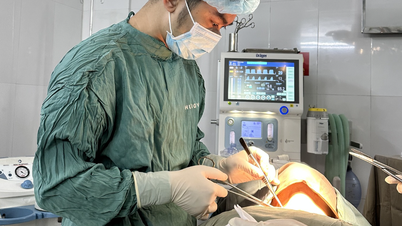

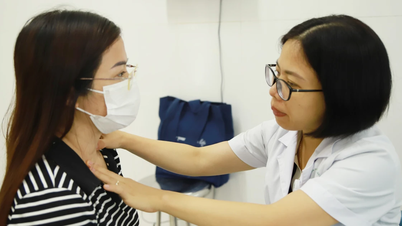

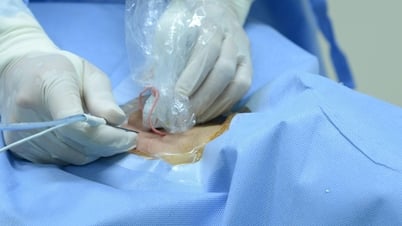



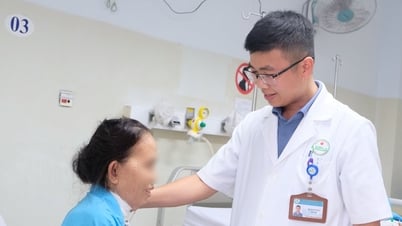

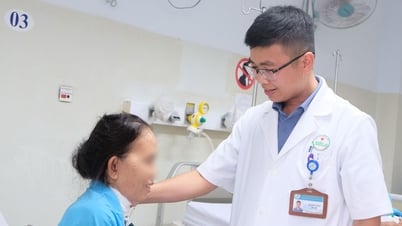


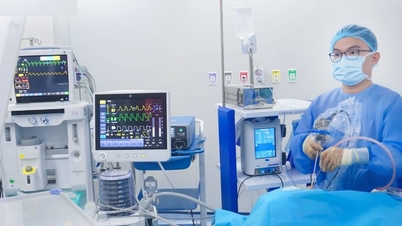

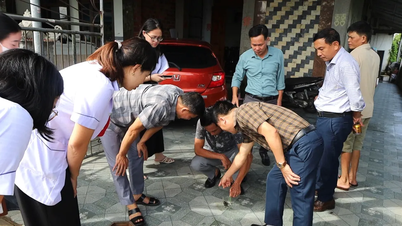

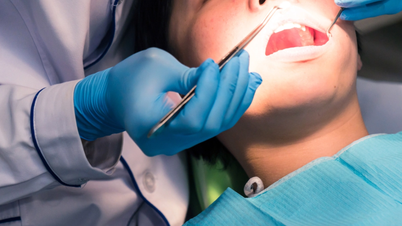


































































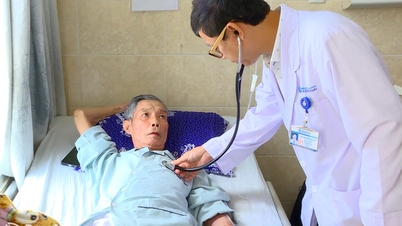

















Comment (0)